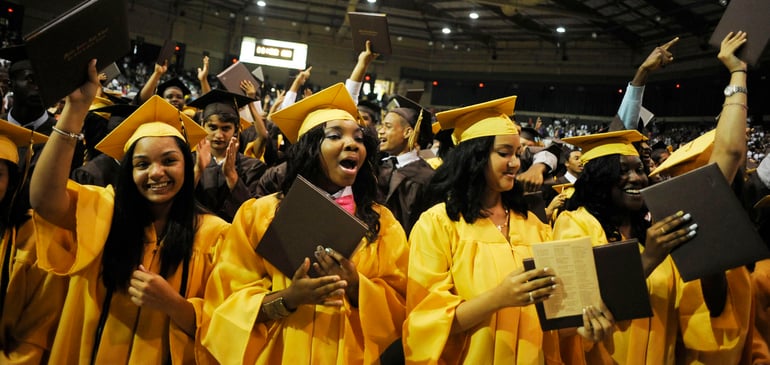Today’s News, Tomorrow’s History is an ongoing series with Listenwise. This series connects Facing History’s themes with today’s current events using public radio to guide and facilitate discussions around the social issues of our time. We will take a look at the recognition given to students fluent in a second language as they graduate from high school.

Image licensed under CC BY 2.0
Some high schools give special recognition to students who can speak and read in two languages. At graduation, these students receive a Biliteracy Seal on their diplomas that recognizes not only test scores but also academic proficiency in two languages. The research by George Mason University has shown that bilingual children perform better academically. In this study, English-language learners in two-way dual-language programs had higher reading and math scores than their peers who speak only one language.
This recognition is a departure from the “Americanization Movement” of the early 1900s and the banning of bilingual education and mandated English-only classes of the 1990s through early 2000. Some resistance to bilingual education was also seen from families who wanted their children to learn English at school and their own language at home. In 2008, a group called Californians Together developed and implemented the Seal of Biliteracy, and in 2011 it became a State Level Seal.
Currently, 26 states and Washington, D.C. have approved a statewide Seal of Biliteracy. This distinction shows appreciation for cultural perspectives and celebrates diversity, along with making these students ready to succeed in a global environment. Listen to hear from teachers, parents, and high school graduates who have received this seal in Rhode Island and learn more about this new movement to honor fluency in a second language.
Join the conversation:
What are the requirements to receive bi-literacy recognition? Why do you think high schools are moving to increase attention to world language education? Would you want to learn another language fluently to earn this recognition? Why or why not? What do you think are the benefits of receiving this recognition?
Keep the conversation going with Facing History’s resources:
- Read this Facing Today post to hear how one teacher used Facing History to better reach her English as a Second Language (ESL) students.
- Use this teaching strategy to help English Language Learner (ELL) students recognize how to pronounce unfamiliar words. By inviting students to read, this strategy encourages class participation and takes the focus off of the teacher as the only source of information.
- Use these four tips for welcoming new students into your classroom, particularly those who are immigrants.
Explore more stories about other languages from Listenwise:
- Listen to hear about how fewer families are speaking their native language at home.
- Learn more about a theater that is using two languages in its performances.
- Listen to this story about people learning Hebrew and how this language is evolving.
- Listen to hear how schools are working to bring back Native American languages.
Listenwise helps teachers use public radio stories in their classrooms. To find more public radio stories and lessons for your middle and high school ELA, social studies, and science classrooms you can sign up for a free Listenwise account!



